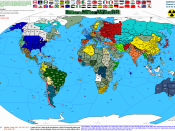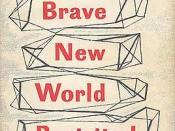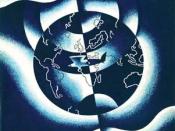Brave New World: "Oh, my God, my God!" In 1932, Aldous Huxley first published the novel, Brave New World. During this time, the ideas that Huxley explored in his novel were not a reality, but merely science-fiction entertainment. Brave New World confronts ideas of totalitarianism, artificial reproduction, anti-individualism, and forever youth- ideas which were not threatening in the 30's. In the 1930's, the high ethical standards people maintained and the limited amount of scientific knowledge did not allow for the acceptance of the types of ideas found in Brave New World. These values include abstinance, family structure, and life-long marriages- issues that had little to no importance in the Brave New World. As we begin the new millenium, our increasing scientific knowledge has taken our curiousity beyond ethical consideration, and Huxley's novel has become much closer to a reality than it was 65 years ago. Today, Huxley's Brave New World parallels current advances in genetical engineering, cloning, the lowering of moral standards held by the general mass, and the obsession people have with looking young.
Theses new discoveries of genetical engineering and cloning closely parallel the process of giving birth in the Brave New World. In Brave New World, people are born artificially in test tubes. Everyone is condidtioned to be the same: to share the same characteristics, their way of thinking, and their ideas. People who claimed individual thought against the community- such as Bernard in the beginning of the novel- were considered to have a defect from a lab mistake during birth, and were ostracized from the community, until they conditioned themself to think like the rest of the community. Scientific development in both genetical engineering and cloning, have made the idea of anti-individualism closer to a reality. Genetical engineering enables parents...


